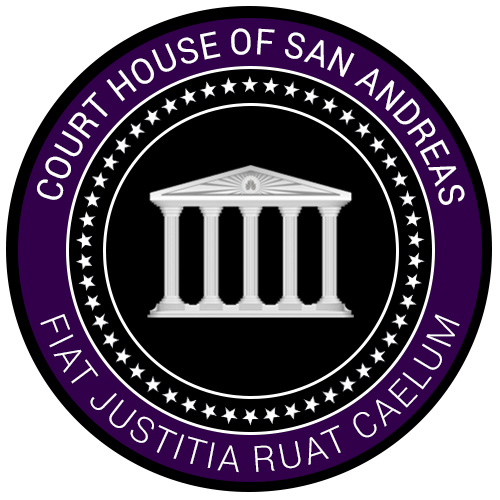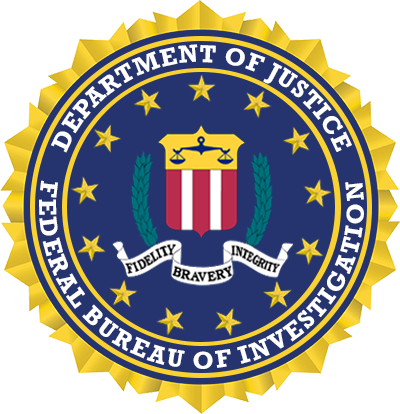 State of San Andreas
First Judicial District Court
United States Courthouse
3321 Downtown Avenue, Los Santos, San Andreas
State of San Andreas
First Judicial District Court
United States Courthouse
3321 Downtown Avenue, Los Santos, San Andreas
United States of America
v.
Hutero Crazy
CASE # CV-0115
HONORABLE JUDGE PRESIDING:
Martin L. Winchester
*BAILIFF: "All rise for His Excellency, the Honorable District Judge Martin L. Winchester, who now presides over these proceedings."*
*Judge Martin Winchester strikes the gavel firmly, calling the courtroom to order and demanding silence.*
Before addressing the substantive merits of this case, I must express my profound disappointment with both parties regarding their conduct in these proceedings. The courtroom is a forum for structured argument and adherence to procedure, yet both the prosecution and defense have demonstrated a lack of decorum by presenting unsolicited commentary. Such behavior not only undermines the efficiency of the trial but also shows a disregard for the standards of professionalism required in this court.
I remind all parties that this courtroom operates under strict procedural guidelines designed to ensure fairness, order, and respect for the judicial process. Any deviation from these principles reflects poorly on those tasked with upholding justice, whether they represent the United States or a private citizen.
With that said, the court will now address the merits of the case.
*Martin Winchester makes himself comfortable on the chair of judgment, he grabs the file and reads into it.*
I. STATEMENT OF FACTS:
1. The Plaintiff, filed a case against the Defendant, Hutero Crazy, for multiple offenses, including possession of illegal controlled substances, failure to obey law enforcement officers, and possession of restricted weapons. The charges arise from the Defendant's actions on November 20, 2024, when FBI agents encountered him running from a crime scene related to threats against a political candidate. Despite being instructed to identify himself, the Defendant refused to comply, leading to his detainment and search, where illegal substances and weapons were found in his possession. The Court also recognizes the Plaintiff's argument against the defense's claims of unlawful detainment and irrelevant interference of the Federal Bureau of Investigation out of their jurisdiction. The court also recognizes and approves the submitted reference of the history of previous court cases, moreover the Court acknowledges that the Prosecution has no witness to call for testimony, however they rely on the presented evidence to back their claims.
2. The Defendant's legal counsel argues that the FBI's detainment was unlawful because the FBI is primarily responsible for investigating federal law violations, not state law violations. Furthermore, the defense claims that there was no probable cause for detaining the Defendant as the FBI agents had not witnessed a crime or had sufficient reason to suspect the Defendant was involved in any criminal activity at the time of his detainment.
The defense also argues that the search of the Defendant's person and belongings violated the Fourth Amendment, which protects individuals from unreasonable searches and seizures, as no valid warrant or probable cause existed for such actions.
The defense contends that the FBI overstepped its jurisdiction by acting on state-level violations without probable cause. The prosecution maintains that the investigation was related to federal interest due to the governor candidate’s role and the serious nature of the attacks.
II. LEGAL CONSIDERATIONS:
1. The Defendant faces the following charges:
SA-PSC § II.14 Unidentifiable persons: The Defendant was wearing a mask and refused to remove it upon request.
SA-PSC § II.26 Failure to Obey a Law Enforcement Officer: The Defendant failed to identify himself when instructed by the FBI agents.
U.S. CODE VII (E)(4)(A), (B), (C): The Defendant was found in possession of controlled substances (cocaine, heroin, methamphetamine) and controlled weapons (M4 assault rifle, sniper rifle, molotov cocktail).
U.S. CODE V (C)(4): The Defendant was found in possession of marked U.S. dollar bills.
2. Evaluation of Evidence:
The Court has reviewed the evidence provided, including dashcam footage from the FBI vehicle, which corroborates the sequence of events leading to the Defendant's detainment and arrest. The footage shows the Defendant’s refusal to comply with lawful commands, followed by the use of a taser to subdue him.
III. ANALYSIS:
The defense argues the FBI lacked jurisdiction, citing U.S. Code Title IV (C) and (F). However, the prosecution demonstrated that the FBI’s investigation of attacks on a governor candidate falls within its federal purview, given the implications for state governance and public safety. Additionally:
1. The FBI has precedential authority to detain individuals on state law violations when directly tied to a federal investigation.
Probable cause was sufficiently established under the totality of the circumstances following the presence at a high-profile crime scene, refusal to identify, and possession of a mask.
2. Probable Cause and Fourth Amendment
The defense asserts the detainment violated the Fourth Amendment. However, the prosecution proved reasonable suspicion existed due to:
The defendant’s proximity to the scene of an ongoing investigation.
His attempt to evade law enforcement when instructed to stop and comply with the lawful orders.
Refusal to identify further elevated suspicion to probable cause, validating the detainment and subsequent search.
3. Evidence Validity
The defense’s claim of evidence nullification due to an unlawful search fails. Probable cause was established, rendering the search and seizure lawful.
IV. ORDERS:
The Court must address a serious procedural error and unprofessional conduct stemming from the delayed response and unauthorized submission by the Defendant’s legal representative, State Attorney Douglas Wilkinson. This delay has disrupted the procedural integrity of this trial, necessitating corrective action and clear warnings to all parties involved. At the preliminary stage of this trial, the Court explicitly sought confirmation from the Defendant regarding their intention to be represented by an attorney. Despite this, Mr. Wilkinson submitted an unsolicited argument against the prosecution's claims, which directly contravened the Court's directives. Such conduct represents a disregard for procedural rules and is wholly unacceptable.
The Court does not take these matters lightly. This is a place of law and order, and unprofessional attitudes or behavior that undermines the administration of justice will not be condoned. The Defendant and their legal counsel are hereby reminded of their obligation to respect this Court and its processes. This Court is steadfast in its commitment to ensuring a fair and impartial trial. However, such fairness demands that all participants observe the highest standards of professionalism and respect for the judicial process. Let this communication serve as a final warning on this matter.
All parties are hereby reminded that these commentaries must be concise, relevant, and based on the evidence or applicable laws. The Court will not entertain redundant arguments and casual debates. Following the conclusion of these submissions, the Court will render a verdict based on the merits of the case which will be analyzed after the last argument.
The judiciary relies on all parties and their counsel to respect the order and decorum of legal proceedings. Any further violations of this nature will result in severe consequences. Specifically, if any of the involved parties fail to adhere to this Court's instructions again, they will be subject to a monetary fine of $100,000.00 as a penalty for contempt of court.
To the Defendant:
In the interest of ensuring a fair and equitable proceeding, the Defendant is hereby granted only one additional opportunity to submit another commentary or supplementary argument addressing the evidence, charges, or laws applied in this case. This submission must be filed within 48 hours of the given order. Failure to submit within the allocated timeframe will not impede the Court’s ability to proceed with a final verdict but may limit the consideration of any new points from the defense.
To the Plaintiff:
The Court recognizes the evidence and arguments submitted thus far. In the interest of maintaining balanced proceedings, the Plaintiff is granted one additional opportunity to provide commentary or rebuttals to the defense’s claims or to offer further clarifications and it is totally voluntary whether they seek to argue or not. Each commentary must adhere to the same 48-hour timeframe following the Defendant's next submission.
Signed,
Honorable District Judge Martin L. Winchester
 [/size
[/size









 [/size
[/size